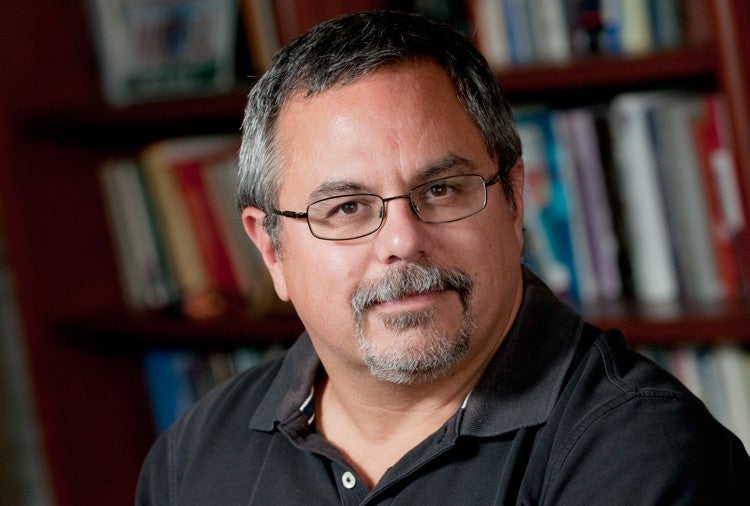October 17, 2014 - By Clifton B. Parker - The political pendulum appears to be swinging back to the Republicans in the upcoming midterm elections on Nov. 4, according to Stanford scholars.
 (Left) Political science Professor Gary Segura says he expects the GOP will make gains in the Senate and modest gains in the House in the upcoming midterm elections. (Photo: Linda A. Cicero / Stanford News Service)
(Left) Political science Professor Gary Segura says he expects the GOP will make gains in the Senate and modest gains in the House in the upcoming midterm elections. (Photo: Linda A. Cicero / Stanford News Service)But the GOP faces issues of its own that may dampen its margin of victory, said Stanford political science Professor Gary Segura.
"The GOP still has two major problems," said Segura, who is a co-principal investigator in a joint Stanford-University of Michigan project, the American National Election Studies, that involves a series of surveys on political participation and voting choices.
Segura said that the Republican Party is not well liked and is less popular than President Obama and congressional Democrats.
"Second, the national demography is shifting strongly against them. GOP congressional candidates get 90 percent of their votes from white voters, and the non-Hispanic white share of the electorate is getting smaller quickly," he added.
In the midterm elections, all 435 seats in the U.S. House of Representatives and 33 of the 100 seats in the Senate will be contested. Also at stake are 38 state and territorial governorships, 46 state legislatures, and numerous state and local races.
Segura expects the GOP will make gains in the Senate and modest gains in the House.
"This is consistent with a long-term pattern where the president's party does poorly in midterm elections," he said, adding that the Democrats are wounded by the president's lack of popularity and the national unease with threats like ISIS and Ebola, as well as other seemingly intractable problems.
This does not mean, however, that the Republicans will win a majority of Senate seats, as some have suggested. Segura calls the chances of that outcome at 50/50, as momentum in that direction has stalled slightly.
As for the president's impact on the elections, he is a drag on his party, according to Segura. "Moreover, he's shrunken, rhetorically. He does not command the attention of the press and population as he once did, and this is a big disadvantage for the Democrats."
Beyond Capitol Hill politics, the political scientist said, the Democrats are showing "surprising resilience" in gubernatorial elections in some Southern states. "It's a reasonable chance of a mixed-outcome election," he said.
Is the Tea Party still a dominant influence in GOP politics?
"On the one hand, it is weakened," said Segura. "Lots of their primary challengers didn't get very far in the first stage of the election. On the other hand, the GOP's policy agenda is fully captured by the Tea Party – so there is less and less distinction between the two."
While Segura said that voter turnout tends to favor the GOP in midterm elections, since older, whiter and more conservative voters vote more reliably, other factors, including GOP unpopularity, weigh in the opposite direction.
California and beyond
David Crane, a research scholar and Stanford lecturer on public policy, is watching this election closely for how it may affect the future of education in California.He pointed out that the nonpartisan race for superintendent of public instruction pits two Democrats with opposing positions on a California judge's ruling earlier this year that teacher tenure laws deprive students of their right to an education under the state constitution and violated their civil rights. Whoever wins may influence the direction of this ruling's effect.
"The race is interesting both for the future of public education in California and the future of the Democratic Party, in which public education is becoming a wedge issue," said Crane.
Beyond California – and the United States – dangers abound, according to Abbas Milani, the founding director of Stanford's Iranian Studies Program. While congressional elections are typically more about local politics than international ones, this year might be a bit different, he maintains.
"In this day and age, when about $6 billion is being spent on these midterm elections, disentangling local politics and national or global agendas is more and more difficult," said Milani, also a founding co-director of the Iran Democracy Project and a research fellow at the Hoover Institution.
From the Middle East and Europe to the United States, global regions are experiencing "tectonic shifts" of politics and culture, he said. ISIS and Iran's nuclear program are two examples of great uncertainty in the Middle East.
"The center, as a poet once ominously but brilliantly said, cannot hold," said Milani.
He said America must be cognizant of threats from abroad. And elections matter, because this is how a country elects leaders to solve such problems.
"If ever Congress could play a critical role in managing these challenges, it is now. But polarized politics in D.C. and political disillusionment across America will likely beget more paralysis than prudence," said Milani.









